"I mean, this guy had his knife between my ribs and I thought, 'Go on then. Are you going to push it in or aren't you?'"
David Barton, a professor in the English Department of the National Central University in Jhongli City (中壢), Taoyuan County is no ivory-tower academic. His life in Taiwan, he told me with a frankness that proved typical of him, has been characterized instead by encounters with brutality, alcohol and violence.
"I've sent one friend home in a box and seen another in a coma he still hasn't recovered from. Another's still in the hospital, and another broke both legs. I've had both arms broken myself. All of us were foreigners, and all these things were alcohol-related," Barton said.
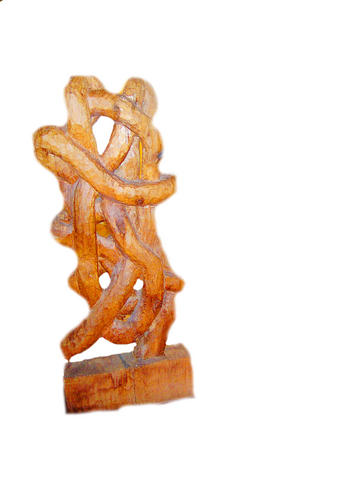
Barton's Rabelaisian novel Teaching Inghelish in Taiwan [reviewed the Taipei Times on Oct. 28, 2007] contains many wild fantasies, but his own experiences here seem to have been, if anything, even wilder.
"Taoyuan and Chungli used to be the center for all this foreigner craziness," he said. "There were three bars, Foxy 1, 2 and 3. They're closed now, but the area remains the armpit of Taiwan.
"We felt we were in some sort of industrial hell. We'd sit on the roof at dawn and watch the factories letting off effluent or long plumes of smoke over Taoyuan. It was as if we were in Ridley Scott's Blade Runner. Even if you went to what we called 'dead dog beach' at Yongan (永安) you couldn't escape the strong sense of Apocalypse Now.
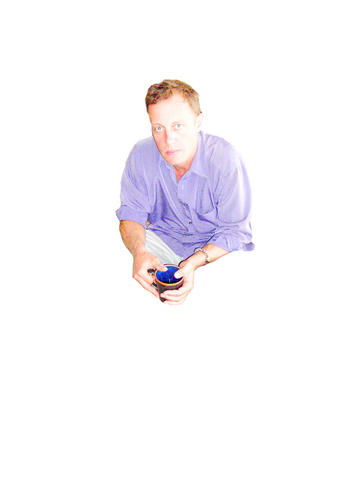
photos: Jay Chen
"Even so, we always looked down on the Taipei foreigners. They all thought they were so special, ugly guys with the most beautiful girls, kings in their own little kingdom. We felt we were the punk rockers on an island of Jimmy Buffett fans."
Barton has been living in Taiwan since 1994. He was brought up in Saskatoon in central Canada. He still has a cabin in the wilds of North Saskatchewan, he says, but he doesn't use it much nowadays.
Were the fights and the drinking a comment on Taiwan, I asked, or on the kind of foreigners it attracts?
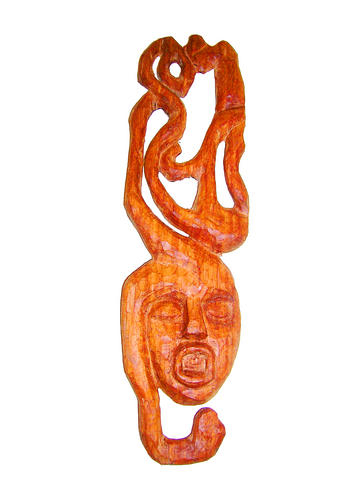
"They're a comment on how some foreigners react to Taiwan," he said. "They get knocked off their center by the place - by the constant availability of alcohol, for instance. And then the binglang [betel nut] girls - your construction-site worker or your English teacher drives home and sees them inside glass boxes in a filthy street. There'd be car crashes in Canada!
"I've seen bodies on the highway that have been simply left there, apparently as a safety message to other drivers. But at the same time they say you shouldn't look, because the ghost is lost and might leap into you through your eyeball.
"The bottle fights in this country are extraordinary. One Australian friend got 24 stitches across his face. An American I know started a fight because he told a Taiwanese who'd spat on the floor to clean it up. The guy had lost face so I knew a fight would erupt, and it did."
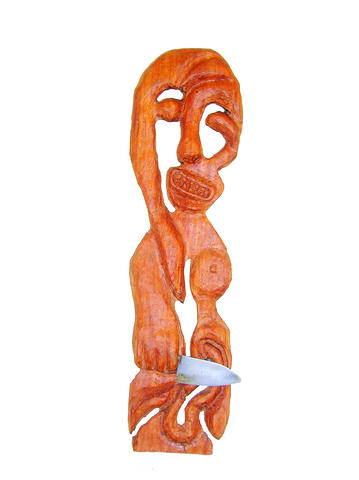
I found this strange as, in nine years here, I've never witnessed a single serious fight. But maybe it depends on where you lived, and who you drink with on a Saturday night.
I asked him how much of what he'd described was reflected in his students.
"Taiwan's university students don't seem to distinguish between cartoon and reality," he said. "This is the extended adolescence the poet Ottavio Paz thought afflicted Mexico. In North America the threshold between adolescence and adulthood has always been high school experiments with sex, drugs and rock 'n' roll. Then after high school you leave home. Somehow the parents in Taiwan won't let their children take on that responsibility, and it shows in the university. In 13 years teaching I can count the number of spontaneous questions I've been asked on one hand."
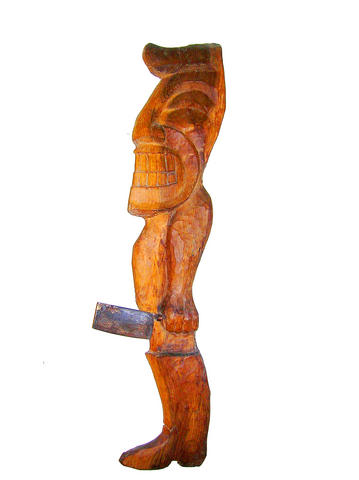
After reading Barton's earlier book, Pornography of the Emotions, Taiwan looked to me for a few hours like somewhere populated by the happily insane. It looks at Taiwanese filmmaker Tsai Ming-liang (蔡明亮), and Taiwanese artists Chen Chieh-jen (陳界仁) and Wong Chi-feng (翁基峰).
I asked him what the title of the book meant.
"It refers to the last moments of [Tsai's 2005 film] The Wayward Cloud (天邊一朵雲)," he replied. "The girl's watching the guy she loves performing pornography. She can't get him to love her, and she cracks. It takes the pornography to create the emotion.
I thought perhaps he was trying to shock me. If so, he succeeded with his next remark.
"Tsai Ming-liang is essentially a realist. His films show an aspect of Taiwan as it really is the surface reality, anyway. The Wayward Cloud actually makes me laugh."
The artist Chen, celebrated for his depictions of Imperial China's "death by 1,000 cuts" with his own head replacing that of the victim, was an expressionist because he offered representations of the Taiwanese unconscious, Barton said.
"He's looking for a way to break the Teflon skin of the Taiwanese. And the muteness in Chen's art is the same muteness I encounter in my students."
As for Wong, his raped and murdered Barbie dolls, Barton said, point to a nostalgia for childhood in a populace stranded in a wilderness somewhere between Japan and the US.
The book's chapters were originally papers given at conferences abroad. Barton doesn't feel he has the right to talk to his students about Taiwanese painters. Instead, he gives courses on Western Civilization from Dante to Wallace Stevens, on Paris in the 1920s, and on painting and jazz in 1950s New York.
"The artists in my book present an extremely alienated and violently schizophrenic Taiwan," he said. In the exaggerated emotional states that resulted, however, there was something absurd, and even funny.
"Not all Taiwan's ugly," he added. "I couldn't believe how lovely Tainan was, and the East Coast. Taichung's easy to live in, and it gets more laid back the further south you go. I don't want to scag Taiwan, just to highlight its Gothic qualities.
"But I've been in too many emergency rooms watching people getting stitched up, and had too many people knock me across chairs. It sounds like William Burroughs, I know. As a writer, I've been influenced by Burroughs - and by Antonin Artaud, sitting there in his insane asylum. I'm currently helping a translator in Vancouver with the first-ever Chinese translation of Burroughs' The Naked Lunch.
Barton is, rather unexpectedly, also a wood-carver. He carves cedar, camphor, soapstone and alabaster. He's influenced by the traditional art of Canada's West Coast, he says. He scarred his hand carving one piece. He doesn't try to sell his work, but instead leaves them "standing around the place."
Even so, it's Taiwan rather than Canada that retains his interest nowadays, or so his books seem to imply.
"Taiwan?" he said as we parted. "Ah yes, this happy prison that holds us all!"

Google unveiled an artificial intelligence tool Wednesday that its scientists said would help unravel the mysteries of the human genome — and could one day lead to new treatments for diseases. The deep learning model AlphaGenome was hailed by outside researchers as a “breakthrough” that would let scientists study and even simulate the roots of difficult-to-treat genetic diseases. While the first complete map of the human genome in 2003 “gave us the book of life, reading it remained a challenge,” Pushmeet Kohli, vice president of research at Google DeepMind, told journalists. “We have the text,” he said, which is a sequence of

On a harsh winter afternoon last month, 2,000 protesters marched and chanted slogans such as “CCP out” and “Korea for Koreans” in Seoul’s popular Gangnam District. Participants — mostly students — wore caps printed with the Chinese characters for “exterminate communism” (滅共) and held banners reading “Heaven will destroy the Chinese Communist Party” (天滅中共). During the march, Park Jun-young, the leader of the protest organizer “Free University,” a conservative youth movement, who was on a hunger strike, collapsed after delivering a speech in sub-zero temperatures and was later hospitalized. Several protesters shaved their heads at the end of the demonstration. A

Every now and then, even hardcore hikers like to sleep in, leave the heavy gear at home and just enjoy a relaxed half-day stroll in the mountains: no cold, no steep uphills, no pressure to walk a certain distance in a day. In the winter, the mild climate and lower elevations of the forests in Taiwan’s far south offer a number of easy escapes like this. A prime example is the river above Mudan Reservoir (牡丹水庫): with shallow water, gentle current, abundant wildlife and a complete lack of tourists, this walk is accessible to nearly everyone but still feels quite remote.

In August of 1949 American journalist Darrell Berrigan toured occupied Formosa and on Aug. 13 published “Should We Grab Formosa?” in the Saturday Evening Post. Berrigan, cataloguing the numerous horrors of corruption and looting the occupying Republic of China (ROC) was inflicting on the locals, advocated outright annexation of Taiwan by the US. He contended the islanders would welcome that. Berrigan also observed that the islanders were planning another revolt, and wrote of their “island nationalism.” The US position on Taiwan was well known there, and islanders, he said, had told him of US official statements that Taiwan had not